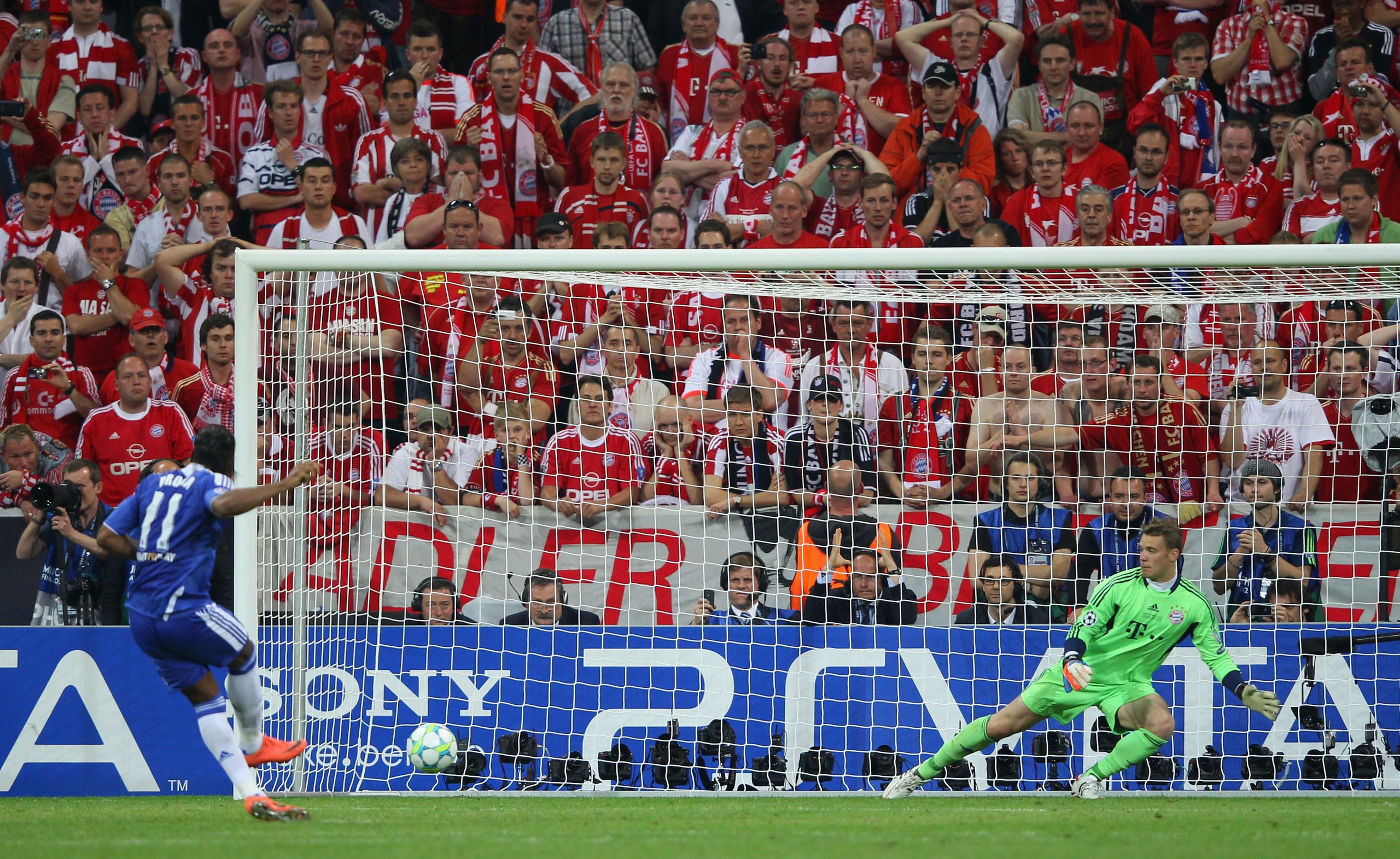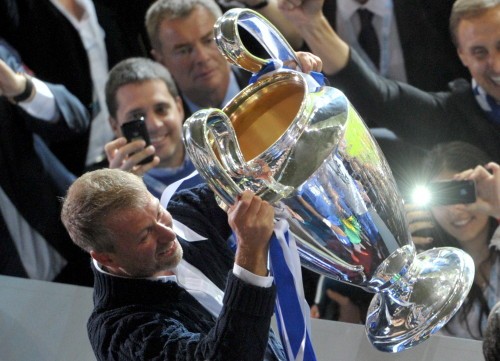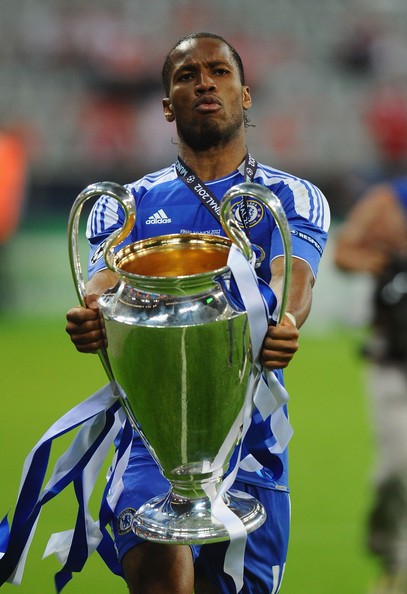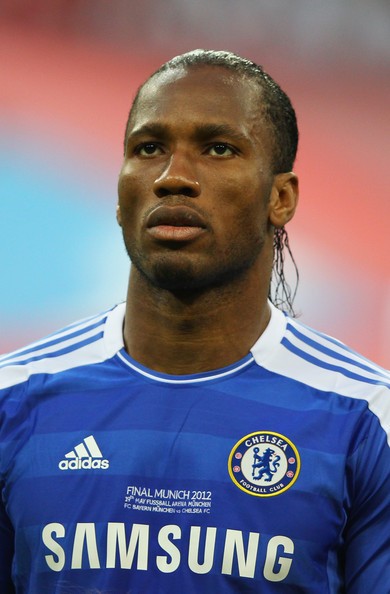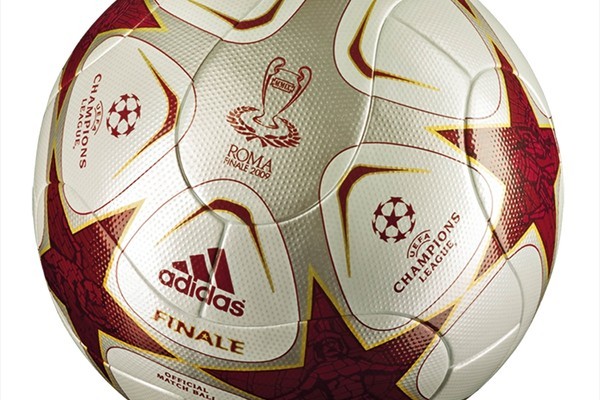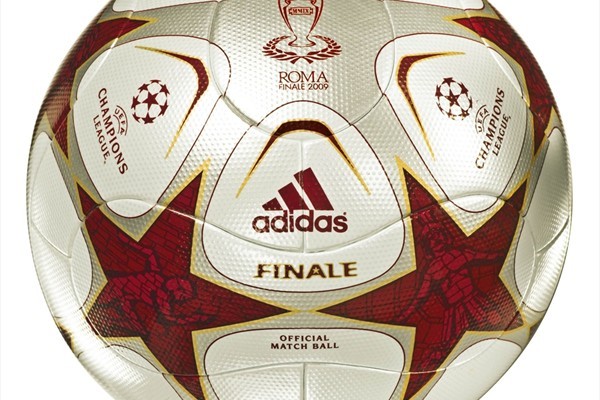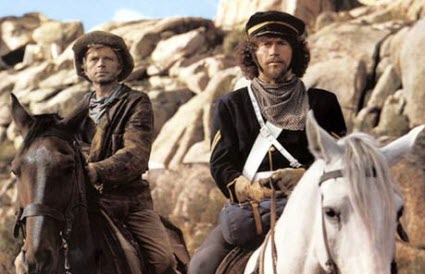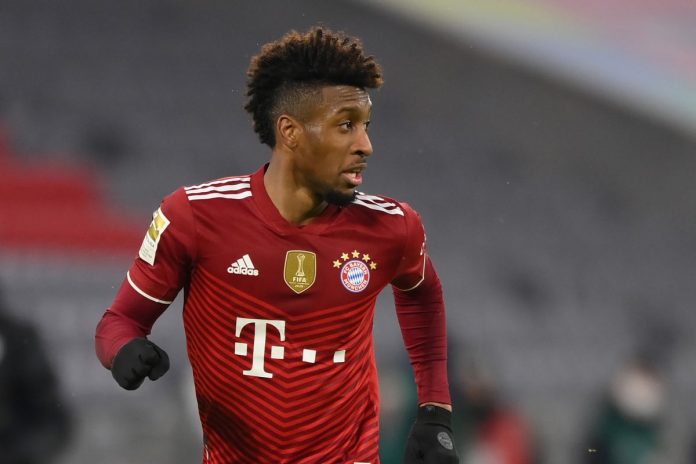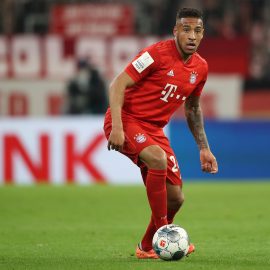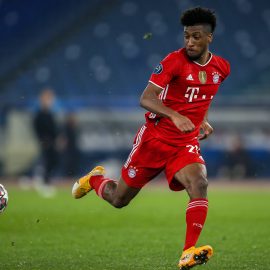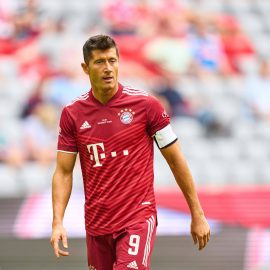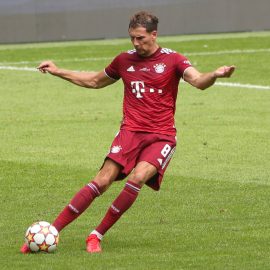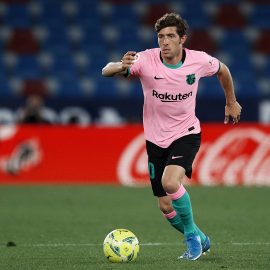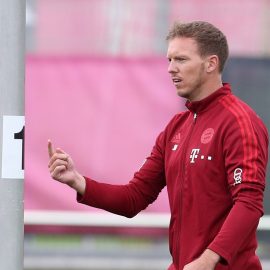The 2011/2012 Champions League Final, to be played between Chelsea and Bayern Munich at the Allianz Arena in Munich on Saturday, 19th May 2012, is going to be a classic.
Both finalists were unfancied going into their respective semi-finals and they overcame unlikely odds to beat Real Madrid and Barcelona. While Bayern came through their two-legged showdown against Madrid with credit and praise for their ability to counter Madrid’s attacking verve and strength, Chelsea’s progress against Barcelona was very much a back to the walls job, and it’s this fantastic performance that has pundits pin the one-off final as more of an equal clash than it would seem on paper.
Indeed, the word out of Bayern is that they’re worried about Chelsea’s remarkable ability to win out of nothing, and while Drogba is playing for Chelsea, anything is possible.
Here’s our in-depth look at the 2012 Champions League final:
THE FINALISTS
THE ROAD TO THE FINAL
THE STADIUM
Home to FC Bayern München and TSV 1860 München, the Fußball Arena München will host the 2012 UEFA Champions League final following a decision made by the UEFA Executive Committee in January 2009. The showpiece will take place on Saturday 19 May 2012.
• The Fußball Arena München took less than three years to build from start to finish, and was completed on 30 April 2005. It was conceived following a referendum in October 2001 when 65.8% of Munich’s citizens voted to construct a new arena rather than regenerate the Olympiastadion, venue for the 1972 summer Olympic Games and previous home of Bayern and 1860 München.
• A year to the day after that vote, work commenced on the stadium, including the construction of the unique exterior. The Fußball Arena München’s transparent outer wall is comprised of foil panels which are lit from the inside and can change colour depending on who is playing; red for Bayern, blue for 1860 München and white for Germany.
• The arena opened its doors to competitive football on 5 August 2005 when a full house of 66,000 watched Bayern defeat VfL Borussia Mönchengladbach 3-0. In January 2006, city authorities approved a 3,901 increase in capacity which means the stadium can now house 69,901 supporters. Some of these reside in standing terraces which are created for domestic games by converting 10,400 seats in each of the north and south stands.
• Located on Werner-Heisenberg-Allee – named after famous German atomic physicist and 1932 Nobel Prize for Physics winner Werner Heisenberg – the Fußball Arena München played host to the opening game of the 2006 FIFA World Cup, Germany’s 4-2 victory against Costa Rica. A further five matches in the tournament were played at the arena, including France’s 1-0 semi-final win against Portugal.
• While some 106 VIP boxes, 400 media seats and 11,000 parking spaces cater for those attending the game, the players make do with two warm-up rooms, a nursery and four changing rooms – one each for Bayern, 1860 München and their respective opponents.
• The Olympiastadion hosted three European Champion Clubs’ Cup finals. Trevor Francis’s strike earned Nottingham Forest FC victory against Malmö FF in 1979 and there was also only one goal in it 24 years later when Olympique de Marseille beat AC Milan to claim the inaugural UEFA Champions League title. In 1997 two Karl-Heinz Riedle efforts set BV Borussia Dortmund on course for a 3-1 win against Juventus.
(source: uefa.com)
Munich finals have habit for upsets
The Fußball Arena München will stage its first European Champion Clubs’ Cup final when the UEFA Champions League concludes there on 19 May.
However, the Olympiastadion – which will host the UEFA Women’s Champions League decider on 17 May – staged the men’s showpiece three times, not to mention the 1974 FIFA World Cup and 1988 UEFA European Championship deciders. UEFA.com looks back at the three previous times the biggest fixture in European club football visited Munich.
The last European Cup final at the Olympiastadion was a triumph for Germany, but not FC Bayern München. Holders Juve started favourites but just as they had taken the title off AFC Ajax the year before, so Dortmund did to the Turin side what Hamburger SV had in the 1983 final. Karl-Heinz Riedle broke the deadlock just before the half-hour and five minutes later headed Dortmund two up. Substitute Alessandro Del Piero reduced arrears with a 64th-minute back-heel but Dortmund then brought on Lars Ricken. With his first touch he brilliantly chipped Angelo Peruzzi from long range to clinch his club’s first European title.
| 26 May 1993 Oly. de Marseille 1-0 AC Milan |
Four years earlier, the first UEFA Champions League final had been at the Olympiastadion – again there was defeat for the Italian favourites. The all-star Milan team including Marco van Basten, Frank Rijkaard and a host of Italian internationals had already lifted the European Cup in 1989 and 1990. They would do so again in 1994, but on this occasion Marseille got the better of them courtesy of Basile Boli’s goal just before half-time. For the country which had invented the European Cup, it was a first triumph.
Two of European football’s less glamorous names had their day in the spotlight in the first Munich final. Injury-hit Malmö, the only ever Swedish finalists, presented a tough test for a Forest side aiming to keep the trophy in England following Liverpool FC’s triumphs in 1977 and 1978. Forest manager Brian Clough was able to give a competition debut to Trevor Francis, the first British player to be signed for £1m, and although he was fielded out on the right wing it was he who headed in John Robertson’s cross just before half-time to clinch the title.
(source: uefa.com)
THE TROPHY
In March 1967, UEFA’s Executive Committee decided, at a meeting in Vienna, to allow Real Madrid CF to keep the original trophy, a silver cup offered by L’Equipe, after the Spanish team’s sixth victory. The Executive Committee then made 10,000 Swiss francs – currently about 6,500 euros – available for a new trophy to be made.
It wasn’t a simple replica of the original cup as UEFA’s General Secretary at that time, Hans Bangerter, decided to create a new design and called in a local specialist in Berne, Jürg Stadelmann. The trophy handed to Liverpool in Istanbul was the fourth version of that design.
“My father Hans and I went along to Herr Bangerter’s office and covered the whole floor with the drawings,” recalled Stadelmann. “He made comments like, ‘The Bulgarians would like the bottom of that. The Spaniards would like that, but the Italians would prefer that and the Germans would go for this bit.’ We put the design together like a jigsaw puzzle. It was a design constituted of many parts yet I like it and I think everyone in football likes it as well.

The trophy is 62 centimetres tall and weighs 7.5kg. It may not be an artistic masterpiece, but everybody in football is keen to get their hands on it.
Nowadays, UEFA regulations allow the Cup to become the property of any club which wins the competition five times or three times in a row. That means that, after fifty years, only Real Madrid CF, AFC Ajax, FC Bayern München, AC Milan and Liverpool FC have earned the right to keep an original in their trophy rooms.
Fittingly, as the European Champion Clubs’ Cup reached the 50th anniversary of the first final in Paris in 2006, the second half-century of the competition kicked-off with a brand-new piece of silverware – produced by the same Bertoni workshop in Milan but, unlike its predecessors, with the names of all 50 winning clubs engraved on it.
A total of 45 different pairs of hands have lifted the Champion Clubs’ Cup since the Real Madrid CF skipper, Miguel Muñoz, first laid his hands on Europe’s most coveted prize in 1956. The roll of honour is an awesome list of some of the continent’s all-time greats, many of whom have gone on to make their mark in coaching after hanging up their boots. What’s more, fans who are superstitious about numbers might note that Bobby Charlton was captain No.9 to lift the trophy; Gianni Rivera was No. 10; and Johan Cruyff – just for a change – was No.14! Curiously, the FC Bayern München honorary president, Franz Beckenbauer, is the only captain to have received the cup three times and no one has lifted it in two consecutive seasons since Franco Baresi and his AC Milan team-mates were crowned kings of Europe in 1989 and 1990
(source: uefa.com)
THE BALL
The official match ball for the 2012 UEFA Champions League final – the adidas Finale Munich – has been officially presented at the venue for this season’s showpiece match, the Fußball Arena München.
As the 12th adidas supplied match ball for a UEFA Champions League final, the adidas Finale Munich will be the first “final ball” to be used throughout the UEFA Champions League knockout stages and not just for the final itself.
The ball’s graphics are inspired by the shape of the Fußball Arena München and they enhance its iconic starball logo design, while the blue and acqua tones are strongly influenced by the reflection of modern local architectural materials, which also build the UEFA Champions League Final Munich 2012 brand identity.
The adidas Finale Munich makes its debut tonight when the UEFA Champions League resumes with two of the eight round of 16 ties – the first leg matches between Olympique Lyonnais and APOEL FC, and Bayer 04 Leverkusen and FC Barcelona.
The UEFA Champions League final takes place in the Bavarian city on Saturday 19 May.
(source: uefa.com)
THE AMBASSADOR
Having lifted the European Champion Clubs’ Cup for FC Bayern München, scored in Germany’s victorious FIFA World Cup final in Munich and been brought up just 50km away there are few people better placed than Paul Breitner to act as ambassador for the 2012 UEFA Champions League final at the Fußball Arena Munchen on 19 May.
The former Real Madrid CF midfielder saw it all in a glittering 13-year player career, but the return of club football’s biggest game to Munich for a fourth time, and first at the new stadium, is a source of great pride for the 60-year-old. “The Champions League final next year in May is the highlight of the whole season, for the city of Munich and for Bayern,” he told UEFA.com. “”The people of Munich, including me, think we have the most beautiful city in the world”.”
As well as being a tourist attraction, Munich is also a footballing hotbed and the Fußball Arena Munchen, which opened in 2005 and houses almost 70,000 spectators for Bundesliga matches, is home to both TSV 1860 München and Bayern, Germany’s most successful club. And it was with the three-time European champions that Breitner first made his name in some 41 years ago.
“In 1970, it was a time of evolutionary change at Bayern Munich. Uli Hoeness, the current club president, and I arrived at the right time to grow into the team, to learn from Franz Beckenbauer and Gerd Müller. We went through a development phase which led us, after our fourth season, to play in our first European Cup final, winning against Atlético Madrid in a replay after drawing the first match.”
That victory came in May 1974, two years after Breitner had helped West Germany win the UEFA European Championship, and two months before he lifted the World Cup. He would go on to become one of his country’s most successful footballers, winning five Bundesliga titles with Bayern and two Spanish championships with Madrid. In 1982 he became only the third player after Brazilians Vavá and Pelé to score in two World Cup finals (an elite club since joined by Zinédine Zidane).
(source: uefa.com)
THE OFFICIAL PROGRAMME
The Fußball Arena München will host the 2012 UEFA Champions League final and the 116-page official matchday programme is the perfect souvenir.
Packed with insight into the season’s most high-profile fixture, the programme features exclusive interviews with the two coaches as well as profiling the players who will perform on the ultimate stage on Saturday 19 May.
The matchday magazine also follows the two teams on the road to the Bavarian capital, and goes behind the scenes at each finalist club. The programme celebrates the great and good who have held the UEFA Champions League Trophy in triumph, including the heroes of the past Munich finals Trevor Francis, Basile Boli and Lars Ricken, while guiding readers through the culture – footballing and otherwise – of the host city and speaks to final ambassador Paul Breitner, among many features.
You may purchase the programme for £8.25 at the Official Online Store of the UEFA Champions League.
(source: uefa.com)
FACTS & FIGURES – THE FINAL
The following statistics were taken from the UEFA Champions League Statistics Handbook.
Finals: 19
Wins: 14
Draws: 5
Goals: 49
Average: 2.58
Extra-time: 5
Penalty shoot-outs: 5
Different results: 9
Most common outcome: 2-1 (4 times)
Both sides scoring: 10
One side scoring: 8
No goals: 1
Total time in minutes: 1860
Minutes per goal: 38
Red cards: 2
RESULTS SUMMARY
| Res | Total | Goals | Res % |
| 2-1 | 4 | 12 | 21.05 |
| 1-0 | 3 | 3 | 15.79 |
| 1-1 | 3 | 6 | 15.79 |
| 3-0 | 2 | 6 | 10.53 |
| 3-1 | 2 | 8 | 10.53 |
| 2-0 | 2 | 4 | 10.53 |
| 4-0 | 1 | 4 | 5.26 |
| 0-0 | 1 | 0 | 5.26 |
| 3-3 | 1 | 6 | 5.26 |
| Totals | 19 | 49 | av 2.58 |
BIGGEST WINS
| 4-0 | AC MILAN v FC Barcelona | (Athens) | 1994 |
| 3-0 | REAL MADRID CF v Valencia CF | (Paris) | 2000 |
| 3-0 | FC PORTO v AS Monaco FC | (Gelsenkirchen) | 2004 |
| 3-1 | BV BORUSSIA DORTMUND v Juventus | (Munich) | 1997 |
| 3-1 | FC BARCELONA v Manchester United FC | (Wembley) | 2011 |
BIGGEST LEAD AT HALF-TIME
| 3-0 | AC MILAN v Liverpool FC | (Istanbul) | 2005 |
| 2-0 | AC MILAN v FC Barcelona | (Athens) | 1994 |
| 2-0 | BV BORUSSIA DORTMUND v Juventus | (Munich) | 1997 |
HIGHEST MATCH AGGREGATE
| 6 goals | AC Milan 3 Liverpool FC 3 | (Istanbul) | 2005 |
| 4 goals | AC Milan 4 FC Barcelona 0 | (Athens) | 1994 |
| 4 goals | BV Borussia Dortmund 3 Juventus 1 | (Munich) | 1997 |
| 4 goals | FC Barcelona 3 Manchester United FC 1 | (Wembley) | 2011 |
FINALS DECIDED BY A PENALTY SHOOT-OUT
| 1996 | JUVENTUS beat AFC Ajax 4-2 after a 1-1 draw |
| 2001 | FC BAYERN MÜNCHEN beat Valencia CF 5-4 after a 1-1 draw |
| 2003 | AC MILAN beat Juventus 3-2 after a 0-0 draw |
| 2005 | LIVERPOOL FC beat AC Milan 3-2 after a 3-3 draw |
| 2008 | MANCHESTER UNITED FC beat Chelsea FC 6-5 after a 1-1 draw |
MOST GOALS BY A PLAYER
TWO:
| Daniele MASSARO | AC MILAN 4 FC Barcelona 0 | 1994 |
| Karlheinz RIEDLE | BV BORUSSIA DORTMUND 3 Juventus 1 | 1997 |
| Hernán CRESPO | AC MILAN 3 Liverpool FC 3 | 2005 |
| Filippo INZAGHI | AC MILAN 2 Liverpool FC 1 | 2007 |
| Diego MILITO | FC INTERNAZIONALE MILANO 2 FC Bayern München 0 | 2010 |
SCORING IN TWO DIFFERENT FINALS
RAÚL González (Real Madrid CF) in 2000 [1 goal], 2002 [1 goal] Samuel ETO’O (FC Barcelona) in 2006 [1 goal], 2009 [1 goal] Lionel MESSI (FC Barcelona) in 2009 [1 goal], 2011 [1 goal]
CLUBS FROM THE SAME NATION PLAYING IN THE FINAL
| Real Madrid CF 3 Valencia CF 0 | Paris | 2000 |
| AC Milan 0 Juventus 0 | Manchester | 2003 |
| AC Milan won 3-2 on penalties | ||
| Manchester United FC 1 Chelsea FC 1 | Moscow | 2008 |
| Manchester United FC won 6-5 on penalties |
SAME CLUBS MEETING IN CHAMPION CLUBS’ CUP/UEFA CHAMPIONS LEAGUE FINALS
| 1969, 1995 | AC Milan and AFC Ajax |
| 1973, 1996 | AFC Ajax and Juventus |
| 2005, 2007 | AC Milan and Liverpool FC |
| 2009, 2011 | FC Barcelona and Manchester United FC |
Note: Real Madrid CF and Stade de Reims both played each other in the 1956 and 1959 Champion Clubs’ Cup final whilst AC Milan and SL Benfica met in 1963 and 1990
SUMMARY OF NATIONS PLAYING IN THE FINAL
| ENGLAND v SPAIN | 3 | 2006, 2009, 2011 |
| ITALY v SPAIN | 2 | 1994, 1998 |
| ITALY v THE NETHERLANDS | 2 | 1995, 1996 |
| GERMANY v SPAIN | 2 | 2001, 2002 |
| ENGLAND v ITALY | 2 | 2005, 2007 |
| ITALY v GERMANY | 2 | 1997, 2010 |
| ITALY v FRANCE | 1 | 1993 |
| ENGLAND v GERMANY | 1 | 1999 |
| SPAIN v SPAIN | 1 | 2000 |
| ITALY v ITALY | 1 | 2003 |
| PORTUGAL v FRANCE | 1 | 2004 |
| ENGLAND v ENGLAND | 1 | 2008 |
THE VENUES (15)
| AMSTERDAM (1) | (Amsterdam Arena, 1998) |
| ATHENS (2) | (Olympic Stadium, 1994, 2007) |
| BARCELONA (1) | (Camp Nou, 1999) |
| GELSENKIRCHEN (1) | (Arena AufSchalke, 2004) |
| GLASGOW (1) | (Hampden Park, 2002) |
| ISTANBUL (1) | (Atatürk Olimpiyat Stadi, 2005) |
| LONDON (1) | (New Wembley Stadium, 2011) |
| MADRID (1) | (Estadio Santiago Bernabéu, 2010) |
| MANCHESTER (1) | (Old Trafford, 2003) |
| MILAN (1) | (Stadio Giuseppe Meazza, 2001) |
| MOSCOW (1) | (Luzhniki, 2008) |
| MUNICH (2) | (Olympiastadion, 1993, 1997) |
| PARIS (2) | (Stade de France, 2000, 2006) |
| ROME (2) | (Stadio Olimpico, 1996, 2009) |
| VIENNA (1) | (Ernst-Happel-Stadion, 1995) |
Note: The old Wembley Stadium in London hosted five Champion Clubs’ Cup finals: 1963, 1968, 1971, 1978 and 1992 whilst the Heysel Stadion in Brussels staged the same number of games in 1958, 1966, 1974 (final and replay) and 1985.
Vienna’s Ernst-Happel-Stadion was the venue for 4 finals in 1964, 1987, 1990 and 1995
PLAYERS WHO HAVE MISSED FINALS DUE TO SUSPENSION
Alessandro COSTACURTA & Franco BARESI (AC Milan) v FC Barcelona 1994
Michael REIZIGER (AFC Ajax) v Juventus 1996
Roy KEANE & Paul SCHOLES (Manchester United FC) v FC Bayern München 1999
Amedeo CARBONI (Valencia CF) v Real Madrid CF 2000
ZE ROBERTO (Bayer Leverkusen) v Real Madrid CF 2002
Pavel NEDVED (Juventus) v AC Milan 2003
Eric ABIDAL & DANIEL ALVES (FC Barcelona) v Manchester United FC 2009
Darren FLETCHER (Manchester United FC) v FC Barcelona 2009
Franck RIBÉRY (FC Bayern München) v FC Internazionale Milano 2010
THIAGO MOTTA (FC Internazionale Milano) v FC Bayern München 2010
José PINTO (FC Barcelona) v Manchester United FC 2011
RED CARDS IN THE FINAL
| Jens LEHMANN | ARSENAL FC v FC Barcelona | 18 minutes | 2006 |
| Didier DROGBA | CHELSEA FC v Manchester United FC | 116 minutes | 2008 |
RECORD OF THE TITLE HOLDER THE FOLLOWING SEASON
| 1992/93 | OLYMPIQUE DE MARSEILLE | [1993/94: disqualified] |
| 1993/94 | AC MILAN | [1994/95: runners-up] |
| 1994/95 | AFC AJAX | [1995/96: runners-up] |
| 1995/96 | JUVENTUS | [1996/97: runners-up] |
| 1996/97 | BV BORUSSIA DORTMUND | [1997/98: semi-finals] |
| 1997/98 | REAL MADRID CF | [1998/99: quarter-finals] |
| 1998/99 | MANCHESTER UNITED FC | [1999/00: quarter-finals] |
| 1999/00 | REAL MADRID CF | [2000/01: semi-finals] |
| 2000/01 | FC BAYERN MÜNCHEN | [2001/02: quarter-finals] |
| 2001/02 | REAL MADRID CF | [2002/03: semi-finals] |
| 2002/03 | AC MILAN | [2003/04: quarter-finals] |
| 2003/04 | FC PORTO | [2004/05: knock-out round] |
| 2004/05 | LIVERPOOL FC | [2005/06: knock-out round] |
| 2005/06 | FC BARCELONA | [2006/07: knock-out round] |
| 2006/07 | AC MILAN | [2007/08: knock-out round] |
| 2007/08 | MANCHESTER UNITED FC | [2008/09: runners-up] |
| 2008/09 | FC BARCELONA | [2009/10: semi-finals] |
| 2009/10 | FC INTERNAZIONALE MILANO | [2010/11: quarter-finals] |
| 2010/11 | FC BARCELONA | [2011/12: semi-finals] |
THE CLUBS WHO HAVE PLAYED IN THE UEFA CHAMPIONS LEAGUE FINAL
SIX FINALS:
AC Milan (1993, 1994, 1995, 2003, 2005, 2007)
FOUR FINALS:
FC Barcelona (1994, 2006, 2009, 2011), Juventus (1996, 1997, 1998, 2003), Manchester United FC (1999, 2008, 2009, 2011)
THREE FINALS:
Real Madrid CF (1998, 2000, 2002), FC Bayern München (1999, 2001, 2010)
TWO FINALS:
AFC Ajax (1995, 1996), Valencia CF (2000, 2001), Liverpool FC (2005, 2007)
ONE FINAL:
Olympique de Marseille (1993), BV Borussia Dortmund (1997), Bayer 04 Leverkusen (2002), FC Porto (2004), AS Monaco FC (2004), Arsenal FC (2006), Chelsea FC (2008), FC Internazionale Milano (2010)
WINNERS OF THE UEFA CHAMPIONS LEAGUE TITLE
THREE TITLES:
AC Milan (1994, 2003, 2007), Real Madrid CF (1998, 2000, 2002), FC Barcelona (2006, 2009, 2011)
TWO TITLES:
Manchester United FC (1999, 2008)
ONE TITLE:
Olympique de Marseille (1993), AFC Ajax (1995), Juventus (1996), BV Borussia Dortmund (1997), FC Bayern München (2001), FC Porto (2004), Liverpool FC (2005), FC Internazionale Milano (2010)
RUNNERS-UP IN THE UEFA CHAMPIONS LEAGUE FINAL
THREE FINALS:
Juventus (1997, 1998, 2003), AC Milan (1993, 1995, 2005)
TWO FINALS:
FC Bayern München (1999, 2010), Valencia CF (2000, 2001), Manchester United FC (2009, 2011)
ONE FINAL:
FC Barcelona (1994), AFC Ajax (1996), Bayer 04 Leverkusen (2002), AS Monaco FC (2004), Arsenal FC (2006), Liverpool FC (2007), Chelsea FC (2008), Manchester United FC (2009)
MOST SUCCESSFUL NATIONS IN THE UEFA CHAMPIONS LEAGUE FINAL
SIX TITLES:
SPAIN (1998, 2000, 2002, 2006, 2009, 2011)
FIVE TITLES:
ITALY (1994, 1996, 2003, 2007, 2010)
THREE TITLES:
ENGLAND (1999, 2005, 2008)
TWO TITLES:
GERMANY (1997, 2001)
ONE TITLE:
FRANCE (1993), NETHERLANDS (1995), PORTUGAL (2004)
Add Sportslens to your Google News Feed!
